Simple Ways for Fleet Managers to Save Money on Fuel
A dozen easy steps to reduce fuel consumption and save money.
The benefits of reducing your fuel consumption hardly need selling.
We’re pretty much all keen to save the planet for future generations by reducing our carbon footprint. Even if you aren’t committed to that, who doesn’t want to save money?
Follow as many of these easy steps as you can, and you could cut fuel consumption across your whole fleet by one third.
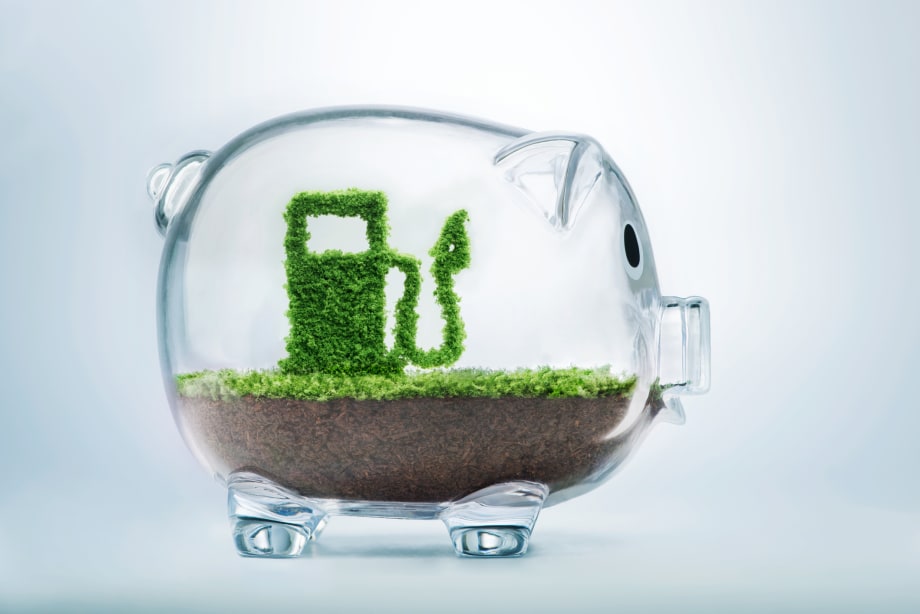
1. Use air conditioning at the right speed
Open the window if you are driving in town. Air conditioning in vehicles uses on average 10% more fuel, but only if you are driving at less than 50 miles per hour (or 80km per hour).

Use air conditioning on motorways and A-roads. Once you go over 50 miles per hour, opening the window creates strong enough aerodynamic drag to use more fuel than the air conditioning.

2. Never leave the engine idling
We really mean this. Never.
Turn off the engine every time you get out of your van or car, and restart when you get back in. The net increased wear and tear from doing this is zero, and for a multi-stop delivery driver the fuel saving can be huge over the course of a working day.
Turn off the engine if you are held up at a red light, level crossing or in a traffic jam.
- Idling for anything over 10 seconds uses up more fuel than the burst needed to restart it.
- The average HGV gets through 5 litres of diesel by the time it’s been left idling for 30 minutes.
- A panel van left idling for half an hour each day will burn through a whole tank of diesel in one month. (Source of data: RAC and Ministry for Transport)
iCompario tip:
Most vehicle tracking and telematics systems can tell you exactly how much time each driver has left his vehicle idling over the course of a day or week. This means you can calculate the amount of fuel each driver wastes and track your drivers as they improve. We can help you choose the right vehicle tracking system to do this cost effectively.
Vehicle tracking can give you a bird’s eye view of your fleet at all times, making it quick and easy to manage all your drivers. You can deal with breakdowns or accidents immediately and even check the driver dashcam footage or speeding incidents from your mobile phone.
As a free comparison site, iCompario can help you find the right system for the right price.
You may need to retrain your drivers to change their habits. Some companies have successfully cut their fuel wastage by incentivising drivers with idling leader boards, and rewards for the most economical drivers.
3. Drive in the right gear
The closer your rev counter gets to the red zone, the more fuel you are wasting.
In a manual vehicle, change up gears as soon as the car is comfortable with the higher gear. Driving in a gear lower than you need wastes fuel.
Take a laid-back approach to building up speed. Taking off like a bat out of hell is a sure way to waste fuel, as you will be in the low gears to build up speed as quickly as possible.
- Most drivers can use 30% less fuel in city driving once they correct their habit of impatient accelerating, and they probably improve their stress levels too.
iCompario tip :
As a fleet manager, you can see statistics on rapid acceleration for each of your drivers in your vehicle tracking software. This gives you the chance to see the worst offenders and encourage a change of habits.
Always change back down a gear as soon as you need to. Letting the engine labour in top gear on hills and corners is also wasteful.
Don’t use the power boost button if you have an automatic transmission. This could even be renamed the “waste a bit of fuel” button.
4. Stop tailgating and remember it’s not a race!
Drive at a good distance from the car in front so you never have to stamp on the brakes.
If your car is fitted with cruise control, use it on motorways to maintain a steadier speed, which will save fuel.
Stop-start driving is much less fuel efficient than driving at a constant speed. It is more polluting and increases the risk of collisions. Getting back to cruising speed while the car is still moving uses far less petrol than stopping completely and then starting again.
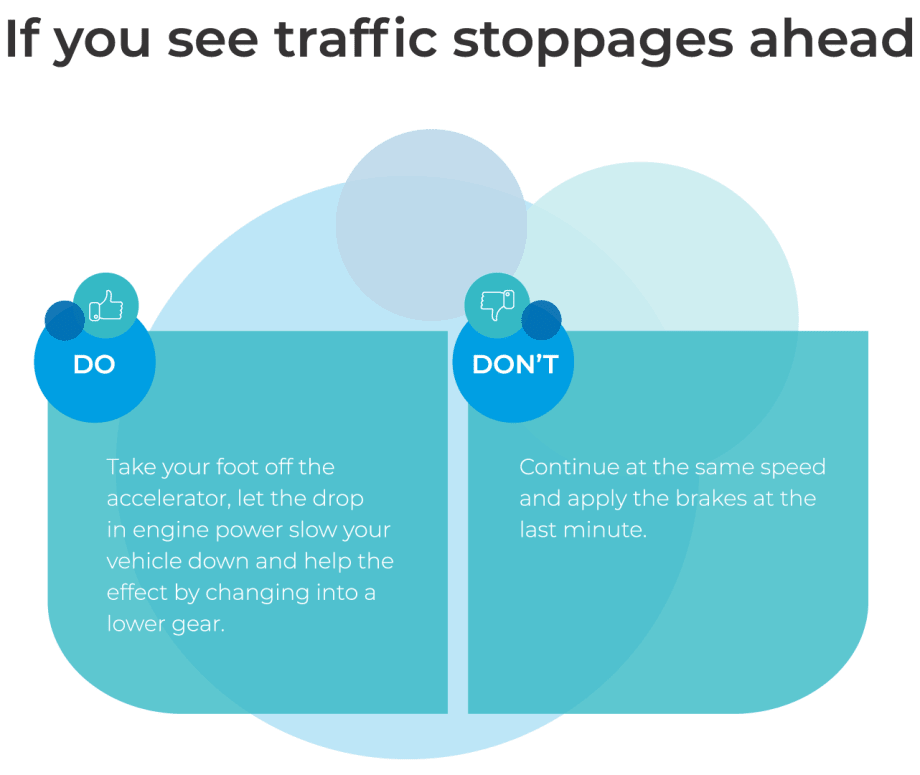
iCompario tip :
If you are a logistics or fleet manager, you can see which roads are regularly delaying your drivers by using a vehicle tracking system. Is there an alternative route? Can you reduce the journeys your drivers make during peak-hours or on congested roads?
Vehicle tracking can give you a bird’s eye view of your fleet at all times, making it quick and easy to manage all your drivers. You can deal with breakdowns or accidents immediately and even check the driver dashcam footage or speeding incidents from your mobile phone.
As a free comparison site, iCompario can help you find the right system for the right price.
5. Don’t speed
Stay under the speed limit and travel more slowly if you can.
- Fuel consumption starts to increase dramatically when you get over 55 miles per hour.
- At 70 miles per hour you use 25% more fuel than you do at 55 miles per hour, which makes motorway driving potentially wasteful.
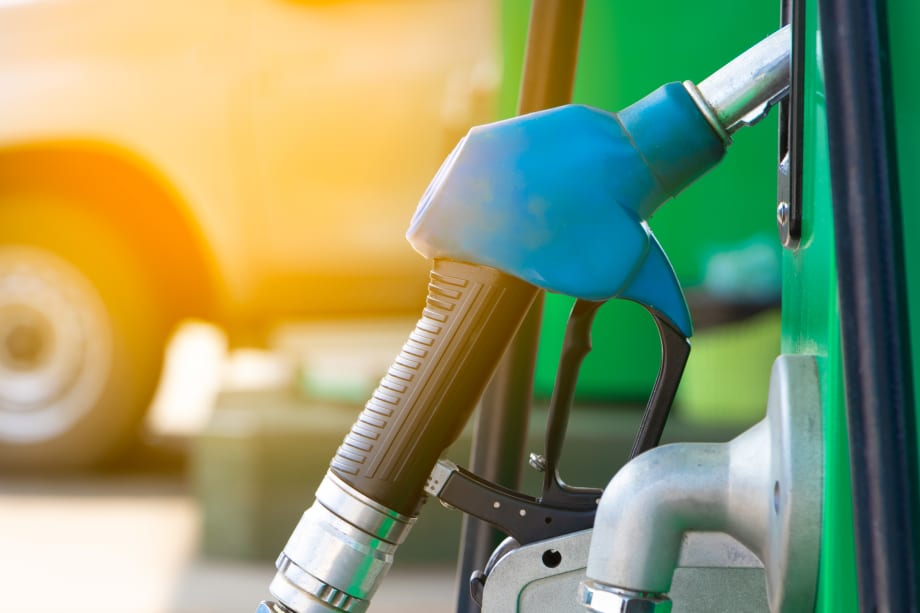
Vehicle tracking systems are designed to help you reduce fuel wastage. They give you driver scores that let you know how often your drivers go over the speed limit and accelerate too rapidly.
6. Do all your trips in one go
Try to make journeys in one long round trip rather than several short ones. Trips of less than 3 miles don’t give most vehicles time to reach their peak operating temperature.
Vehicles are least fuel efficient and most polluting at the start of trips when the engine is cold, and on short trips. One reason for this is that catalytic converters (which reduce air pollution emissions) do not operate properly until they have warmed up.
7. Use conference calls to cut out unnecessary journeys
If the lockdowns of 2020 taught us one thing, it’s that there’s no need to drive far and wide for meetings in person.
Conference calls increase productivity as they completely cut out time wasted travelling. Not only this, modern software makes it easy to share your screen with colleagues, record the dialogue and get a written transcript afterwards, which gives many people a more useful meeting.
iCompario tip:
If your internet connection or productivity software isn’t delivering what you need to make online meetings a breeze, iCompario can help you find everything what you want. We have data on all the UK’s leading broadband providers, and conference call software options.
Vehicle tracking can give you a bird’s eye view of your fleet at all times, making it quick and easy to manage all your drivers. You can deal with breakdowns or accidents immediately and even check the driver dashcam footage or speeding incidents from your mobile phone.
As a free comparison site, iCompario can help you find the right system for the right price.
8. Minimise aerodynamic drag
Is there a roof rack or ladder loader on your van? It increases air resistance and fuel consumption. Are your employees driving around with an advertising board on the van roof, or any other customisation your company could manage without?

- At higher speeds, a roof rack can make your vehicle use 20% more fuel.
- Other additional parts on the exterior of a vehicle, including some spoilers, will also increase fuel usage.
Take off roof racks or ladder bars when you are not using them. If you have to use them, load them carefully to help minimise wind resistance, or use a streamlined roof box instead.
9. Look after your vehicle and its tyres
Keep your vehicle engine well-tuned and regularly maintained.
Get your vans and cars serviced at the intervals specified in the manufacturer’s handbook.
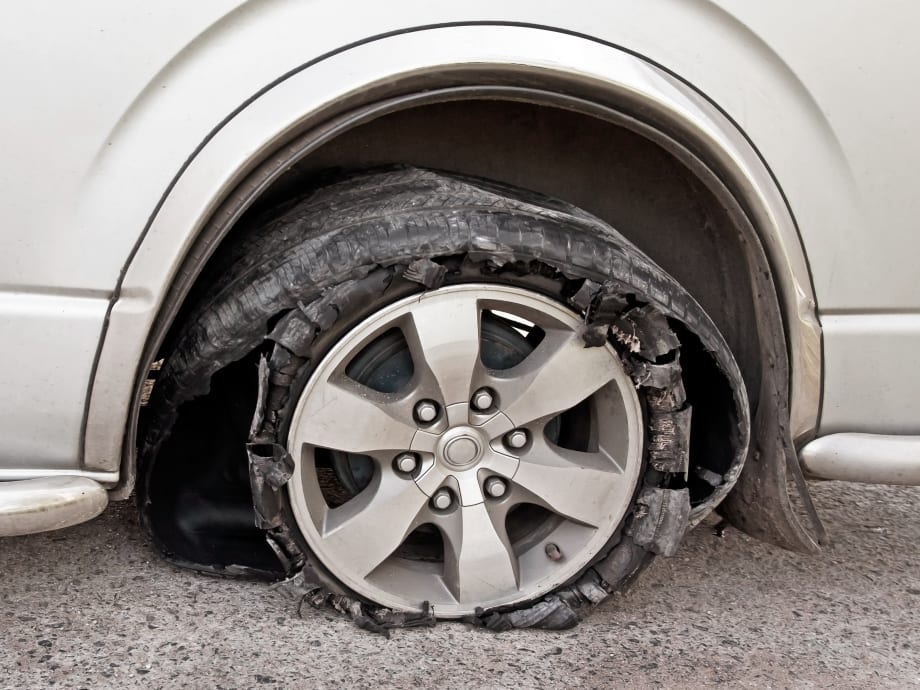
Inflate your vehicle’s tyres to the highest pressure recommended by the manufacture and make sure your wheels are properly aligned.
- Under-inflated tyres lower gas mileage by about 0.2% for every 1 psi drop in the average pressure of the tyres.
- The proper tyre pressure for your vehicle is usually found on a sticker in the driver’s side door jamb or inside the glove box, and in your owner’s manual.
Looking after your tyres will not only reduce your fuel consumption. It will also extend tyre life and improve vehicle handling, which keeps your drivers safer.
10. Travel light
Leave heavy items at home or the depot when you don’t need them on a trip. Do you have a set of tools that live in your van? Is it basically a mobile store room? The more weight a vehicle carries, the more fuel it uses.
Examine your drivers’ delivery rounds. Are they taking large amounts of merchandise on needless journeys? Could your loading and delivery patterns be more efficient?
Are your fleet vehicles right for the job? If you are using large panel or transit vans when a smaller, lighter van could do the job, you will be wasting fuel on every trip.
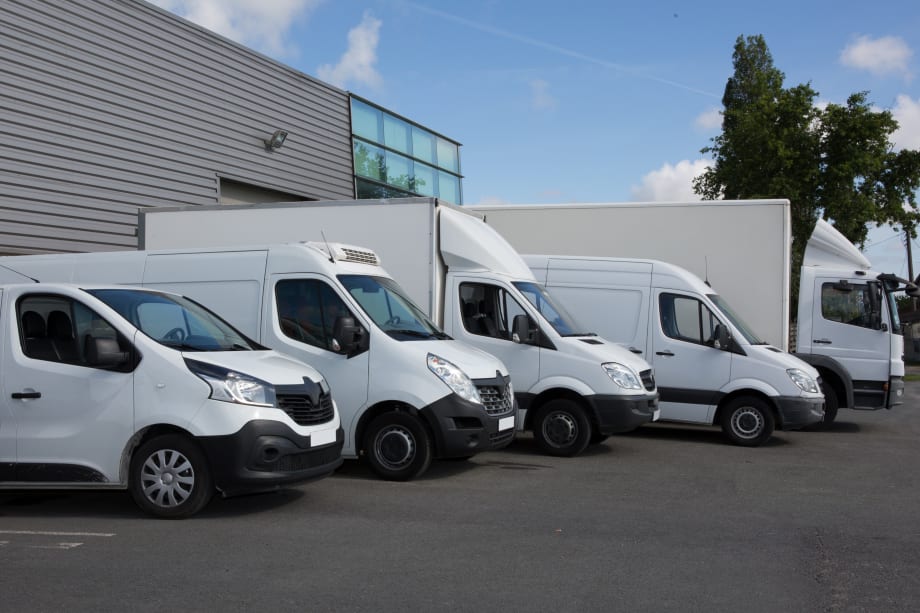
11. Use premium quality diesel or petrol
All the leading companies – BP, Shell and Esso – make high-tech diesel designed to clean and condition diesel engines and improve their miles per gallon performance. They cost a little more, but they really do work. You can make further savings with less frequent vehicle servicing as well.
12. Use the right fuel cards and track your miles per gallon
When did you last compare the prices on your fuel card? Are you still getting the best deal on the market? If you have had your fuel card for more than a year, there may be newer pricing options or alternative networks available that can save you money.
iCompario has data on 95% of the fuel cards available in the UK and we can help you find the best option to match your business and your fleet.
Vehicle tracking can give you a bird’s eye view of your fleet at all times, making it quick and easy to manage all your drivers. You can deal with breakdowns or accidents immediately and even check the driver dashcam footage or speeding incidents from your mobile phone.
As a free comparison site, iCompario can help you find the right system for the right price.
Track how well your fleet is performing
Using fuel cards can measure the miles per gallon performance of every vehicle in your fleet. With most providers, you download a CSV file of your fuel-spending data, then match it up to your drivers’ mileage from the vehicle tracking software.
UK Fuels is part of a large company that provides both vehicle tracking and fuel cards from a wide choice of different companies. It matches both these data sets up for you in the same customer portal or app, making it much simpler to get an accurate miles per gallon performance for each vehicle and driver every week or even day.
However you do it, measuring your fuel consumption against driver productivity accurately is the key to keeping on top of your fuel spending and saving money, as well as the environment.